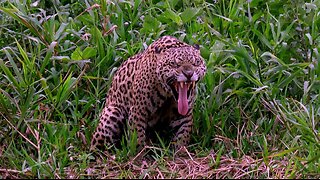Premium Only Content

Amazing adaptation allows marine iguanas to survive on salt water
Marine iguanas are incredible examples of adapting and evolving to survive in impossible conditions and harsh climates. These lizards are descended from land iguanas that needed fresh water and terrestrial vegetation to survive. The Galapagos Islands formed 4 million years ago and life found its way here. In some cases, animals were brought here unintentionally, adrift on the masses of floating vegetation or on the ocean currents. Marine iguanas are believed to have evolved 8-9 million years ago when they inhabited parts of the archipelago that are now submerged. When the islands formed, they found their way ashore on the new structures and made them their homes.
These iguanas live in a hostile climate where water and vegetation is scarce for much of the year. During the dry season, there would be no food and no fresh water. The iguanas adapted to life here by eating the algae that grows along the shore and under the waves. Females and younger iguanas feed in the intertidal zones while the larger males are strong enough to dive for algae, sometimes as deep as 30m (98ft) and can spend as long as one hour underwater. This ability to swim in strong current and hold their breath is what allows them to thrive where food is difficult for most animals to access.
The marine iguana consumes exclusively red and green algae that has a high salt content. The buildup of salt in the marine iguana's body would lead to dehydration and death if the iguana did not have a way of expelling salt. These animals have developed specialized cranial exocrine glands to help them filter salt out of the blood. The salt is then expelled from the body in a manner that resembles sneezing. This iguana can be see snorting out salty fluid as it basks in the sun.
Marine iguanas are cold blooded reptiles and they must bask in the sun to keep their bodies warm enough for efficient movement and food digestion. Their dark colour helps with heat reabsorption. They are also capable of lowering their heart rate to 30 beats per minute to help conserve warmth as they swim in the colder water. While basking, their heart rate increases to 100 beats per minute to help them spread the heat throughout their body.
In a world where the conditions are not ideal for survival, the adaptations of the animals in the Galapagos Islands can mean the difference between perishing and surviving. The marine iguana is a perfect example of overcoming the challenges and adapting to the environment.
-
 1:18
1:18
WildCreatures
1 month ago $2.91 earnedTourists unintentionally come face to face with jaguar in Brazil's Pantanal
16K17 -
 1:25:16
1:25:16
efenigson
1 day agoDigital Money or Digital Prison? - Nick Anthony | You're The Voice - LIVE from Lugano PlanB Forum!
4.46K3 -
 13:26
13:26
Cash Jordan
15 hours ago“PORTLAND MOB” Storms ICE HQ… ‘COMBAT’ Troops Respond With EXTREME FORCE
9.06K29 -
 16:00
16:00
Demons Row
13 hours ago $4.23 earnedBIKERS OF FLORIDA 💀🏍️ Outlaws, Warlocks, Mongols & the Wild South
6.26K8 -
 22:01
22:01
Jasmin Laine
16 hours agoTrump’s BRUTAL WARNING Leaves Canada Speechless—America STUNNED
8.57K37 -
 11:42
11:42
China Uncensored
17 hours agoThe Chinese Military Turns Its Gun on Xi Jinping
7.6K19 -
 2:36
2:36
The Official Steve Harvey
16 hours ago $1.48 earnedThis Is Bigger Than Comedy — It’s About Saving Young Men
6.96K2 -
 8:09
8:09
Hollywood Exposed
19 hours agoMatthew McConaughey EXPOSES The Real Reason He Left Hollywood
6.33K7 -
 29:38
29:38
Stephan Livera
2 days ago $5.12 earnedDay 2 - Stephan Livera hosts Plan B Podcast in Lugano
11.8K2 -
 1:01:47
1:01:47
vivafrei
18 hours agoLive from Lugano Plan B in Switzerland w/ Efrat Fenigson and Prince Filip Karađorđević!
57K5